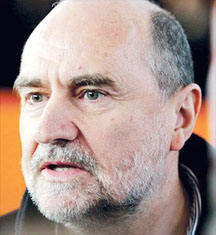VIENNA, (Reuters) – The U.N. nuclear watchdog and Iran failed at talks yesterday to unblock a probe into suspected atom bomb research by the Islamic state, a setback dimming any chances for success in higher-level negotiations between Tehran and major powers later this month.

The International Atomic Energy Agency, using unusually pointed language, said no progress had been made in the meeting aimed at sealing a deal on resuming the IAEA’s long-stalled investigation, and it described the outcome as “disappointing.”
It came just a few weeks after U.N. nuclear chief Yukiya Amano said he had won assurances from senior Iranian officials in Tehran that an agreement would be struck soon.
Herman Nackaerts, the IAEA’s global head of inspections, said after the eight-hour meeting at its headquarters in Vienna that no date for further discussions on the matter had been set.
The IAEA had been pressing Tehran for an accord that would give its inspectors immediate access to the Parchin military complex, where it believes explosives tests relevant for the development of nuclear arms have taken place and suspects Iran may now be cleaning the site of any incriminating evidence.
The United States, European powers and Israel want to curb Iranian atomic activities they fear are intended to produce nuclear bombs. The Islamic Republic says its nuclear programme is meant purely to produce energy for civilian uses.
Six world powers were scrutinising the IAEA-Iran meeting to judge whether the Iranians were ready to make concessions before a resumption of wider-ranging negotiations with them in Moscow on June 18-19 on the decade-old nuclear dispute.
The lack of result may heighten Western suspicions that Iran is seeking to drag out the two sets of talks to buy time for its uranium enrichment programme, without backing down in the face of international demands that it suspend its sensitive work.
“It should by now be clear to everyone that Iran is not negotiating in good faith,” a senior Western diplomat said.
A European envoy also accredited to the IAEA said: “This is a dismal outcome … Iran is simply wasting time with its evasions and refusal to engage.”
Nackaerts said his team had come to the meeting with a desire to finalise the deal and had presented a revised draft that addressed earlier stated concerns by Iran. “However, there has been no progress,” he told reporters.
“And indeed Iran raised issues that we have already discussed and added new ones. This is disappointing. A date for a follow-on meeting has yet to be fixed.”
Late last month, Amano returned from a rare, one-day visit to Tehran saying the two sides had decided to reach a deal and that he expected it to be signed soon.
Pierre Goldschmidt, a former chief U.N. nuclear inspector, said Iran likely did not want to make any concession to the IAEA just 10 days before the Moscow talks without getting something in exchange.
“It is indirectly a deliberate and unnecessary insult to Director-General Amano who recently went to Tehran in order to reach a deal,” he said.





